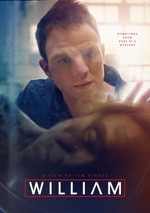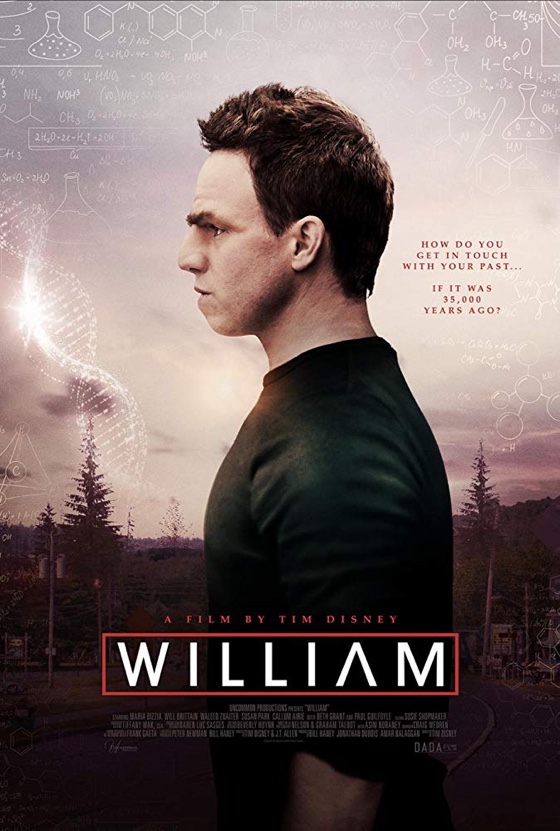
I’m “biast” (con): nothing
(what is this about? see my critic’s minifesto)
Oh, I really wanted to like this movie. I so wanted to be emotionally excited and intellectually engaged by it. Nothing is more up my alley than science fiction about ideas, and about the morality and the ethics of scientific discovery. Nothing is more up my alley than sci-fi about how the things we dream of and the wonders we make happen impact us as individuals and impact culture in the grand scheme. But William is such a tremendous disappointment, an almost unforgivable missed opportunity to explore a frontier of technology — human cloning combined with genetic engineering — that I have no doubt will be broached as soon as it is feasible. If it hasn’t been already.
See, cuz William is a movie about a scientific power couple, academics Barbara Sullivan (Maria Dizzia: While We’re Young, Lola Versus) and Julian Reed (Waleed Zuaiter: 20th Century Women, London Has Fallen), who fall in love over their secret project: an attempt to clone a Neanderthal. Which they are able to do because of a discovery of preserved Neanderthal soft tissue from which they can extract viable DNA. (It’s unclear whether this is up-to-scientific-date, but if it isn’t, it’s certainly not outside the realm of possibility and soon could be.) They soldier on with the project over the objections of their university colleagues — “As a bioethicist, I find the idea abhorrent,” one of them says, and thank you very much, though that’s about the only nod the movie makes to the morality of the project — to the point where Barbara herself carries the embryo and they raise the resulting baby as their own son.

Or, you know, sort of. The poor kid (played briefly by prosthetic-assisted Connor Wilkinson as a baby and by Brody Wilkinson as a toddler) is stuck in a laboratory, which is cruel and inhumane to a conscious human being — which is absolutely what William is, which anyone can see and, cripes, what does the Hague have to say about this? (The movie is silent here.) And it’s also bad science, a poor way to determine what “normal” might have been for a Neanderthal child of the world of 50,000 years ago. Sullivan/Reed was always going to be bad science apart from the most fundamental kind of practical, technical biology! Because it’s completely, unscientifically impossible to extrapolate what Neanderthal culture might have been like from a single individual born into a 21st-century homo-sapiens society, nor what specifically and uniquely Neanderthal cognitive abilities might be determined from a single individual at all!
No one here says anything about this issue.
I mean, if aliens a million years from now clone an individual of the extinct homo-sapiens species from the remains of someone who randomly happened to have been a meathead athlete (and I’m not saying all athletes are meatheads, but c’mon, some of them definitely are), would they be correct in deducing from the behavioral tendencies and the ingrained interests of their clone that homo sapiens of planet Earth were uninterested in philosophical or intellectual pursuits and were instead all about pumping up and working out? Of course not. (And vice versa: an introspective thinker would be no more representative of humanity, either.)

Yet the bulk of William is concerned with teenaged Neanderthal William (prosthetically assisted Will Brittain: Kong: Skull Island, Lila & Eve), and it keeps dropping hints that one of the reasons why he is struggling in high school (he’s been sprung from the lab) is not because he’s stupid or backward or unevolved — he seems pretty smart and thoughtful, in fact, and he’s really very sweet, just a nice, great kid; Brittain is lovely — but because he just thinks differently from how homo sapiens do. He’s very literal, for one, doesn’t really get metaphor… but that’s true of plenty of homo sapiens! Apart from his heavy brow ridge — which could mean that, ha, Tommy Lee Jones or Josh Brolin was his dad, actually, not that he’s a member of an extinct human cousin species — he doesn’t seem terribly unusual. He’s a bit of an oddball and doesn’t quite fit in. But, like, who wasn’t and who didn’t as a teenager?
Look: William is basically Jurassic Park but about people. This is a horror movie, but director and cowriter (with J.T. Allen) Tim Disney (American Violet) doesn’t seem to realize that, and there’s certainly no Ian Malcolm character running around with this hair on fire yelling about the very many, very real problems with what has been done here. Yes, this director is one of those Disneys, but this is not a “Disney” movie, not by a long shot… except it kinda is, too. It’s a family drama with a bit of Science! mixed in. William is far more concerned with whether William will pass his college-entrance exams and if the pretty girl playing the lead opposite him in the school play like-likes him or not. It is far more concerned with how Barbara eventually realizes she’s a mother, goddammit!, to William rather than a researcher studying him and divorces Julian because he puts scientific analysis of William over being his dad and… ugh with this complete bullshit stereotyping of (21st-century homo sapiens) people as either Men Of Reason or Women Of Emotion. As if you cannot be both a rational intellectual and a loving parent at the same time, no matter what bits you have between your legs.

But that all pales next to the utter abdication of the role this movie assigns to itself, to examine the ramifications of *checks notes* bringing a sentient individual of an extinct human species into existence to be the only one of his kind among seven billion others. I mean, whether you want to go hard-core Spock-ish “this dude ain’t like anyone else on the planet” or soft-core metaphorical “oh, we are all misfits LOL,” William does not satisfy, and ultimately descends into a finale that feels like no one knew where else to take it; it’s not a reasonable finale, either, though. And in the way of many cinematic science-fiction stories, its ending fobs off dealing with the very things that should have been dealt with here to the people of its imaginary aftermath left in the wake of the damage done.
William doesn’t seem to know what it wants to say about anything. Not anything that it overtly depicts, and not anything that it covertly suggests. Which is particularly problematic when we need to be having real, substantive culture-wide conversations about what this movie is about now. (Disney actively chucks off that conversation here by having William’s birth publicly announced but, after a brief flurry of outrage, the fact of his existence reverting to low-level acceptance, then all but forgotten.) I actually wouldn’t be in the least bit surprised if what is depicted here, or something very close, hasn’t already happened, in secret. (We cloned Dolly the sheep more than 20 years ago. Sheep are really not less complex than humans, genetically speaking. There may well be cloned homo sapiens walking around right now. How far off is a cloned Neanderthal?) And apart from global warming and maybe artificial intelligence (though that seems further away), this is the thing that has the biggest potential to radically change our perspective on everything, from our understanding of the past to what it means to be human right now. Astonishingly, William barely seems aware of the questions it raises.






















Oh, that’s too bad. I was intrigued by the trailer as well.
I seem to recall the Thursday Next books and Kage Baker’s Company books doing more interesting things with the concept of coexisting with/bringing back Neanderthals, though that wasn’t the focus of the stories…
It’s not about *cloned* Neanderthals, but Robert Sawyer has written a terrific trilogy of novels about a parallel world (which ends up interacting with ours) about an Earth on which Neanderthals survived to dominate and now have a technology similar to ours, but with a very different culture. It starts with *Hominids*: https://amzn.to/2IIXNYM
I’m sure I had these books in the back of my mind as I was watching *William.* Sawyer is one of my favorite SF writers: his work is so humane and humanist even while he explores the profound ideas and extrapolations he plays with. I cannot recommend his work highly enough.
Thanks, I’ll check the book out! I read Sawyer’s Wake/Watch/Wonder trilogy on your recommendation many years ago, and loved it. Though I do wonder how it would hold up on a reread: I recall he had a pretty rosy view of how the interconnectivity of the Internet was going to liberate us all, and he may not have anticipated certain developments. :-(
Funny you mention those, cuz I’ve been thinking I need to reread them and see how they hold up.
Very interesting review. I’ve also been looking forward to seeing “William,” not least of all because I’ve read Sawyer and am currently writing my own novel, but in the other direction (traveling back to the late Paleolithic).
I was hoping for a serious version of “Encino Man” (which I actually saw in Encino!). De-extinction is a fertile playing field for narrative fiction, and, as you point out, the biotechnology is already here for this, if one wants to surmount the financial and ethical obstacles.
BTW, seeing as you’re originally a New Yorker, you might be interested in my “New York 1609,” the first saga that depicts the founding of NYC from its earliest beginnings since Washington Irving’s 1809 satire. And I go into depth about the legendary 1626 “purchase” from the Lenape for “beads and baubles.”
(Oh, and I’m no Admin here; just using an old Disqus handle, which I can’t seem to get rid of; apologies if confusing)
I’ll look for it!
√√√
https://www.amazon.com/gp/product/B07D2N3X2V/
Another superficial movie to make everyone feel comfortable. I would have considered more interesting a plot in which after cloning the primitive neanderthal, it had resulted in the following: the neanderthal is stronger, smarter, more perseverant and tenacious, and more moral and human than everybody else, with no signs of stupidity or weakness, so it triggers the admiration and hate reactions of all modern humans around, because they feel they are just a bad imitation, like the monkeys in the zoo but humans are the monkeys looking out to the real human. Like a kind of terror movie at the end, or “I am legend” (the book, not the bad movie they did)
There was a very old classic sci-fi short story, I forget the author. But a Neanderthal boy was brought back from the past, who was clearly miserable. Woman scientist did the humane thing by taking him back in time to the same spot and staying with him.
Was that “The Ugly Little Boy” by Isaac Asimov? I haven’t read it in years, but it seems to fit the description.
YES! Yes, that was it! Thank you!
That… rings a bell. I must have read that eons ago…
The gestational environment makes a huge difference to the development of an embryo; it sends signals that trigger or suppress gene expression. So that’s a whole extra level of bad science – without knowing what a Neanderthal womb was like, you have no idea at all whether what you get from the cloning is in any way authentic.
Really, isn’t this basic story done better by Frankenstein?
Excellent point. And it’s not just a Neanderthal womb that’s lacking here but a Neanderthal environment: preindustrial, preagricultural, etc.
A big problem with this movie is that it doesn’t even seem to realize that it’s telling a Frankenstein-adjacent story. :-(